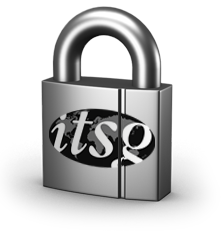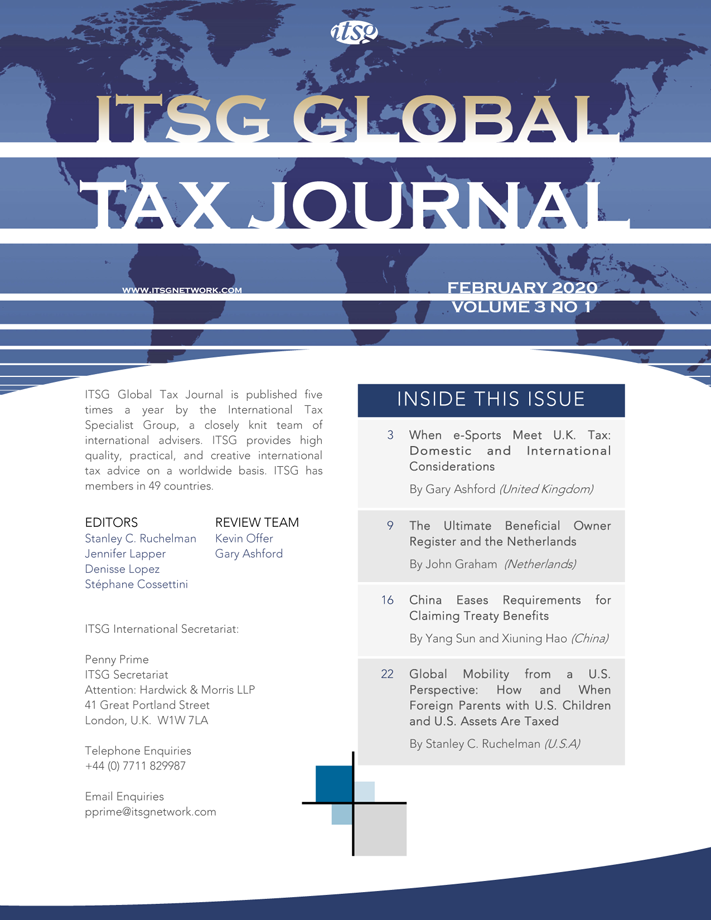INTRODUCTION
The 5th Anti Money Laundering Directive of the European Union (the Directive)1 is, in fact, an amendment to the 4th Anti Money Laundering Directive2. It provides for the introduction of the Ultimate Beneficial Owner (U.B.O.) Register throughout the E.U. The provisions are required to be included in the Member States’ legislation and to be effective by 20 January 2020. The original directive required the provisions to be included in domestic legislation by 26 June 2017, but only three countries met this target. Even the current date will not be achieved throughout the E.U.
In the Netherlands, the legislation has not yet passed all legislative stages and, therefore, will be among those which are late. Nevertheless, the current drafts are unlikely to change significantly.
Those outside the E.U. may think that they will not be particularly affected by this. However, while the legislation covers most E.U. business entities, it can have important consequences for individuals living anywhere if they have an interest in an E.U. entity. In certain cases, it may even impact an individual who has no economic interest but takes part in the management of another entity (whether E.U. or foreign) somewhere within a structure.
The Directive places obligations on individuals to provide information, and some of this information will be publicly available. Being shown as a U.B.O. of an entity may give the impression that an individual has an economic interest in an entity where in fact this is not the case.
WHAT DOES THE DIRECTIVE SAY?
The Directive states:
Member states shall ensure that corporate and other legal entities incorporated within their territory are required to obtain and hold adequate, accurate and current information on their beneficial ownership, including the details of the beneficial interests held. Member states shall ensure that breaches of this article are subject to effective, proportionate and dissuasive measures or sanctions.
The register is intended to fight financial and economic crimes such as money-laundering, corruption, tax evasion, fraud, and the financing of terrorism.
Basically, the Directive stipulates that there should be two levels of access to the U.B.O. Register:
- The information in the register should be accessible to competent authorities and financial intelligence units without restrictions.
- Part of the information should be available to certain other entities and also to any member of the general public.
Trusts (and similar arrangements) are also referred to in the Directive, but as they fall under separate rules, they are covered at the end of this article.
As is normal with an E.U. directive, the various countries are free to implement it into their legislation as they wish and, in certain cases, can go further than the requirements of the Directive.
WHO IS A U.B.O.?
According to the legislation, a U.B.O. is a natural person who is the ultimate owner of, or has control over, a company or other legal entity. The law itself does not state when an individual is considered a beneficial owner. This is dealt with in an implementation decree. However, the Dutch decree does not give a complete definition. It only states who will be treated as a U.B.O. in any event.
For a company, a U.B.O. is anybody who has:
- More than 25% of the shares
- More than 25% of the votes
- More than 25% of the ownership interest
- Actual control over the business
If nobody falls under the above categories, a so-called pseudo-U.B.O. has to be registered. This will normally be a person or persons in the senior management of the company itself, such as a C.E.O. or, in the case of a partnership, the general partner(s).
The first two categories above are fairly clear, but in the third, issues can arise where there are classes of shares with different rights. This can be the case with preference and priority shares which have a priority right to a certain part of the profit (or assets on a liquidation) but not to the excess. Depending on the result of the company in a particular year, these shareholders may or may not have a 25% ownership interest.
It is not clear how some types of shares which have (extra) voting rights in certain situations should be treated. However, where such rights allow appointment of more than half the managing or supervisory directors, this would most likely qualify as actual control.
Actual control over the business may be difficult to determine. In such cases, the 25% limit does not apply. The decree refers to the consolidation of the annual accounts as one means of control. This would seem to be reverse logic since the consolidation of accounts does not, itself, give control over anything. However, the requirement to consolidate may be an indication of control.
It is conceivable that one could also have control over a business if one is a major supplier or a major financier. Arguably, therefore, a bank could be the U.B.O. of a business. While the bank itself does not have to register its U.B.O.’s if it is listed on a stock exchange, the entity being financed would still need to register. According to a strict interpretation of the legislation it would then be necessary to determine whether the bank has a shareholder with more than a 25% interest.
The pseudo-U.B.O. rule applies where no other U.B.O. can be determined. It should be noted that in such cases the legislation provides for the senior management of the company to be treated as the U.B.O., rather than going up the structure to the management of the ‘top’ entity. The Bureau for Financial Supervision (Bureau Financieel Toezicht), one of the regulatory bodies, already follows the approach in the decree. However, the Dutch Central Bank, which is also a regulatory authority, takes the view that one should look at the management of the entity furthest up the structure with an interest of more than 25%. While there is some logic to this, it is not what the legislation states.
All entities must have a U.B.O. (or a pseudo-U.B.O.), even if there is no individual with an interest of more than 25%. Registration is required, and it is simply not possible to report that there is no U.B.O.
It is clear that a legal entity could have many U.B.O.’s, since the legislation does not look at who has ‘most’ control.
Remarkably, even charitable foundations are required to register a U.B.O. It is difficult to see how such entities can be considered to have a U.B.O. Even more remarkable is that the board of the foundation will generally be considered to be the U.B.O. despite the fact that (at least under Dutch law) they are specifically excluded from benefiting from the foundation.
There is no guidance in the Dutch legislation as to how one is to treat a trust which is a beneficial owner. There are also no provisions or guidance covering the situation where a company is indirectly controlled or where an insurance company is an owner.
A U.B.O. is legally required to provide information to the relevant legal entity.
WHO AND WHAT IS COVERED?
The most obvious entities to which the legislation applies are Dutch B.V.’s (Besloten Vennootschap) and Dutch N.V.’s (Naamloze Vennootschap) not listed on a stock exchange.
It is understood that listed N.V.’s already provide sufficient information with respect to ownership; therefore, they are not required to register their pseudo-U.B.O.’s. In practice, it is open to question whether similar information is provided by a listed company.
Other legal entities are also covered:
- Foundations
- Associations
- Mutual insurance companies
- Cooperatives
- So-called administration foundation and charities
- An association without legal personality but with a business
- A partnership, including a limited partnership
- Shipping companies (these are special types of entity in the Netherlands)
A European Company (Societa Europea or S.E.) or European Cooperative Society (S.C.E.) with its statutory seat in the Netherlands is also covered. A European Economic Interest Grouping (E.E.I.G.) is covered, although it does not need to have its statutory seat in the Netherlands.
Stock exchange listed companies and their 100% subsidiaries are excluded. Non-100% subsidiaries (even 99% subsidiaries) are not excluded.
Other exclusions are:
- Sole traders
- Public bodies
- Residential associations
- Certain historical entities
- Associations without legal personality and without a business
- Churches (required to maintain U.B.O. information but not to register)
The legislation does not apply to foreign entities, for instance branches or companies with a head office in the Netherlands but not incorporated there. The Netherlands has a concept of the ‘formal foreign company’, which is a foreign entity run from the Netherlands and which for all other registration purposes is considered Dutch. While a formal foreign company must comply with many Dutch corporate requirements, it will not fall under these rules. Foreign entities incorporated in other E.U. countries will need to register their U.B.O.’s in their own country. Non-E.U. entities will not be required to register any U.B.O. unless that country has legislation of its own.
An interesting point is that, for the purposes of this legislation, a company which has moved its domiciled out of the Netherlands and registered in another (normally E.U.) country is still considered to be incorporated under Dutch law. In theory, it is required to re-register in the Netherlands simply for the purposes of U.B.O. reporting. This would seem to be overkill in view of the fact that such companies will almost always be located in another E.U. jurisdiction and should be subject to similar legislation there. This provision also applies to the S.E., S.C.E., and E.E.I.G. It is conceivable that any such an entity would be required to register in two (or more) jurisdictions if it moves from one country to another.
WHEN MUST ENTITIES REGISTER AND HOW LONG SHOULD INFORMATION BE KEPT?
New entities must register their details immediately, while existing entities have 18 months to comply with the legislation.
In the Netherlands, information should be available for 10 years after the de-registration of the company. There is no indication of how long it should be kept otherwise, and presumably, there is no limit. It is questionable as to whether this complies with data protection rules.
WHAT WILL BE MADE PUBLIC?
The register will be managed by the Dutch Chamber of Commerce, which is also the companies and foundations registrar. Companies are required to maintain the information in respect of the register even in cases where the U.B.O. is exempt from being made public.
Where applicable, the following information will be public:
- Full name
- Month and year of birth
- Nationality
- Country of residence
- Type and extent of interest in bands (i.e., more than 25% but less than 50%, 50% but less than 75%, and over 75%)
Even where personal information of a U.B.O. is exempt from public access, the extent of the interest still must be shown.
What has to be registered but is not public?
- Tax identification number (both the Dutch number and the foreign number if one has been granted on the basis of residence elsewhere)
- Day of birth
- Place and country of birth
- Address
- Copy of valid identity documents and other documentation to support the personal details above
- Copy of documentation showing type and extent of interest
Access
The public part of the register is open to anybody on payment of a fee. A search is only possible on the basis of the entity, not on the basis of the U.B.O. However, the Dutch Chamber of Commerce frequently sells information, and it is not clear whether other parties will be allowed to purchase and repackage this information to make such a search possible.
The legislation has been amended to provide that anybody wishing to access the register will have to identify themselves. This is likely to delay matters somewhat.
The non-public part of the register is accessible to authorised agencies such as supervisory authorities (the Dutch Central Bank, Financial Markets Authority (A.F.M.), etc.), tax authorities, and the Financial Intelligence Unit. Organisations which are subject to anti-money-laundering provisions, such as banks, lawyers, accountants, car dealers, and estate agents, will not have access to this part of the register.
A U.B.O. will be entitled to see whether there are significant numbers of requests concerning their ownership (except if these are from the authorities) but will not be able to see who has made the requests.
Exemptions
Under the Directive, a U.B.O. is entitled to an exemption from public (but not government) access to their information where there is a risk of kidnapping, violence, blackmail, or intimidation. Under the Dutch legislation, a request for exemption will only be granted if the person concerned has police protection under Dutch law or similar protection under the laws of another country.
It seems that the exemption will not be available to anyone else at risk of kidnapping, violence, blackmail, or intimidation. This appears to contravene the letter and, certainly, the spirit of the Directive. It also goes further than other rules applying to directors of charitable entities, where an exemption from publication is available to directors and their family members if there is real danger to their personal safety, whether or not they have police protection.
The Dutch data protection regulator had, apparently, no comments on this or other aspects of the legislation.
Minors and individuals without legal capacity are exempt from public access to their information.
In all cases an application must be made for the exemption, even in the case of minors where one might expect that the exemption would be granted automatically. If a request is made, the information will not be made public until it has been rejected and any objection or appeal procedure is completed.
ISSUES FOR ADVISORS
Accountants, tax advisors, notaries, and banks are not permitted to rely on the register and, therefore, must obtain identity information on U.B.O.’s for compliance purposes. This seems a substantial duplication of effort (already banks are often required to have the same information and generally will not provide the information to advisors). However, advisers are required to check the information in the U.B.O. register, and if there is a discrepancy with the information they have, they are required to report this to the Dutch Chamber of Commerce.
Regulators, such as the Dutch Central Bank and the A.F.M., sometimes take a different view as to exactly who should be considered the U.B.O. An example might be where somebody has a loan which gives rise to a profit share but does not actually give control over the business and is, technically, not an entitlement to any part of the profit.
As indicated above, the Bureau for Financial Supervision, supervising inter alia tax advisers and notaries, uses a different U.B.O. definition than the Dutch Central Bank, which supervises banks and corporate service providers. This could result in discrepancies so that both banks and advisers must file a notification. And it raises the question of which definition prevails. The view of the author is that a discrepancy in such a case would not warrant notification if it is justified and explainable, but there is no guidance on this.
Under separate legislation, which will shortly apply for mandatory disclosure of certain tax structures by advisers, advice to avoid being shown as a U.B.O. will be a disclosable matter.
FOUNDATIONS
In the Netherlands, foundations are treated as legal entities and, therefore, fall under the company U.B.O. register. In some jurisdictions a foundation is considered to fall under the trust register. This will be important, partly in relation to the entry of the trust into the trust register and partly because the information is then available only to a natural or legal person who can demonstrate a legitimate interest.
Foundations are required to keep a register with the names and addresses of everyone to whom a distribution has been made which does not exceed 25% of the amount available for distribution in a particular financial year, together with the amount and the date.
In certain cases, Dutch foundations are used as a so-called ‘administration office’. The foundation owns shares of an entity and in turn issues a depository receipt giving the holder the economic rights of a shareholder but not the voting rights. It should be noted that the depository receipt holder can reasonably be considered a U.B.O. where he or she has an interest of more than 25%. Since the foundation, generally, will exercise the voting rights, it will normally also be considered a U.B.O. One would not look through the foundation to its beneficiaries since they would not have an economic or voting interest in the underlying company. The depository receipt holders are not beneficiaries of the foundation.
POLICING
Failure to register or registering incorrectly is an economic crime. Sanctions for minor infringements will be administrative, while there can be criminal sanctions for providing incorrect U.B.O. information.
The tax authorities are responsible for policing the legislation through the Bureau of Economic Enforcement (Bureau Economische Handhaving). They will only take action if informed of an issue by the Dutch Chamber of Commerce.
The tax authorities have produced a report which states that the legislation is implementable but that enforcement will have only a limited effect. While it is relatively easy to check whether information filings are timely, the tax authorities anticipate that confirming the accuracy of the information is likely to be difficult. In general, information cannot always be obtained from other countries, and information on deliberately non-transparent structures will be difficult to acquire. They also consider the proposed legislation to be susceptible to fraud since people who do not want to be shown as a U.B.O. are likely to provide incorrect or incomplete information. Furthermore, they may decide to use entities which do not fall under the legislation.
COSTS
The government has determined that the costs of complying with the legislation are negligible. The U.B.O. is required to provide information to the company. It is estimated that the company will take an average of one to two hours to register at a cost of €39 per hour. If it has to use external advisors, this can be done for €60. However, for most international businesses, these figures will not be anywhere near realistic.
TRUST REGISTER
Article 31 of the Directive contains a separate provision covering trusts:
Member states shall ensure that this article applies to trusts and other types of legal arrangements, such as, inter-alia, fiducie, certain types of treuhand or fideicomiso where such arrangements have a structure or functions similar to trusts. Member states shall identify the characteristics to determine where legal arrangements have a structure or functions similar to trusts with regard to such legal arrangements governed under their law.
The provisions apply to any express trust administered in the relevant member state and require information on the beneficial ownership of the trust, including:
- The settlor
- The trustee
- The protector
- The beneficiaries or class of beneficiaries
- Any other natural person exercising effective control over the trust
Under the Directive, information in the trust register will not be accessible to the general public except if they have a legitimate interest, unlike that in the company register. A trust will also be required to provide information to a company which needs the information for its own U.B.O. filing. It is interesting to note that certain countries, including the Netherlands, treat foundations as regular legal entities falling under the same rules as companies, while others consider them to fall under the trust register.
In the Netherlands, the trust register will be implemented later and will include the so-called fund for common account. This is a purely fiscal concept.
Since the Netherlands does not have legislation governing trusts, it is unlikely that this register will be very extensive.
CONCLUSION
The new rules are more complex than they look and can affect individuals located around the world, not just in the E.U. It is not difficult to become a U.B.O., even if you are not a shareholder in an entity.
Advisers also need to be aware, both where there is a discrepancy between the U.B.O. in their compliance documentation and the U.B.O. in the register and also where they are advising on when an individual should or should not be registered as a U.B.O.
1 Directive 2018/843.
2 Directive 2015/849.

 Login
Login




















































